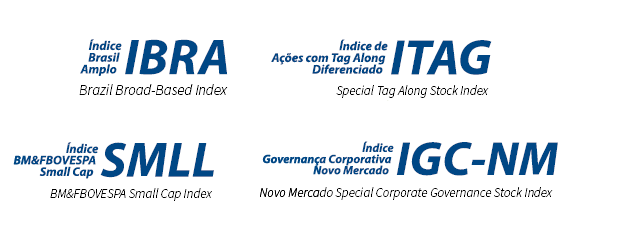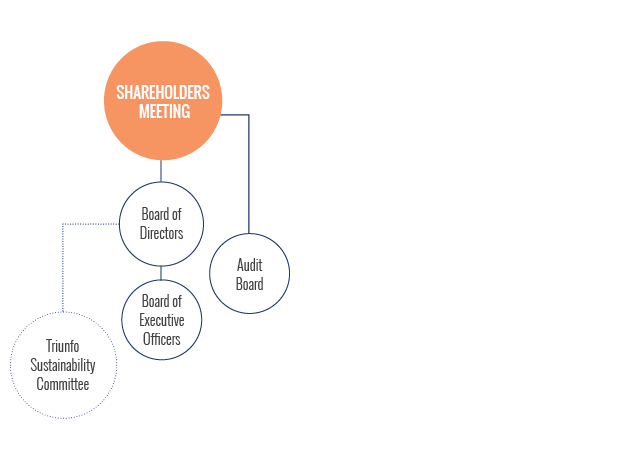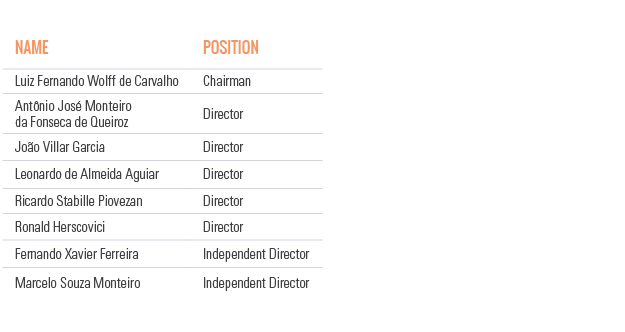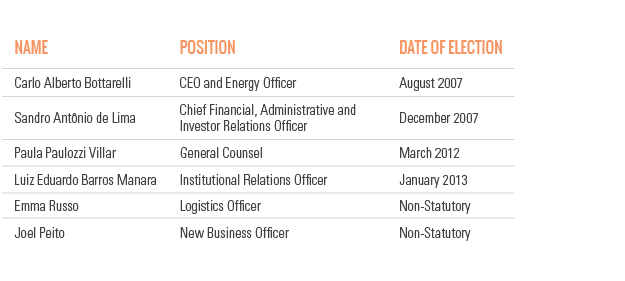Corporate governance
As recommended by the Triunfo Sustainability Policy, Triunfo undertakes to create value for all stakeholder groups, which directly depends on corporate governance best practices.
|
Its membership of the Novo Mercado – the highest level of corporate governance on the Securities, Commodities and Futures Exchange of São Paulo (BM&FBovespa) – broadens shareholder rights and ensures the quality of information disclosed regarding its businesses. |
Staunch in its goal of continuously improving its governance processes, the Company set up the Triunfo Sustainability Committee in 2014 – an important step towards integrating sustainable practices with its organizational culture (learn more on "Ethics and integrity").
Triunfo shares on the following indexes


Structure and Composition
Triunfo’s governance structure consists of its Board of Directors, Audit Board and Board of Executive Officers. The Annual Shareholders Meeting (ASM), in which all the shareholders have the right to participate, is the company’s main decision-making forum [1]. G4-34

Board of Directors
Triunfo’s Board of Directors establishes the general business policies and guidelines and evaluates the economic, environmental and social aspects of its activities. It is a collective decision-making body, responsible for determining the Company’s long-term strategies, for controlling and overseeing its performance each quarter and for supervising management by the Board of Executive Officers, including evaluation of the organization’s risks. In compliance with corporate governance best practices and the Bylaws of Triunfo, the positions of chairman of the Board of Directors and CEO of the Company are not held by the same person [2].
G4-38 G4-39 G4-42
In accordance with Novo Mercado listing regulations, the Board is made up of eight members, at least 20% (i.e. two) of whom are independent directors. One of them is elected by minority shareholders, in accordance with Brazilian Corporation Law.
Independent directors have no business or professional relationship with Triunfo. They are compensated solely for their work in the Board of Directors [3].
Directors hold office for a term of two years and may be reelected. At the last Annual Shareholders Meeting, held on April 26, 2013, representatives of shareholders present elected, through cumulative vote, members of Triunfo’s Board of Directors for the period 2013-2015.
G4-40
Triunfo’s Board of Directors (on 12/31//2014)

The Board’s duties include overseeing processes related to the management of corporate risks, implemented by different areas of the Company and reported to the Board by executive officers at quarterly meetings. This analysis includes economic, social and environmental aspects and was strengthened in 2014 with the creation of the Triunfo Sustainability Committee, coordinated by an independent director. G4-46 G4-47
Audit Board
Independent from the Company’s management and external audit, the Audit Board monitors management decisions and analyzes the financial statements of Triunfo, reporting its observations to shareholders. It is also responsible for evaluating impacts, risks and opportunities resulting from economic issues. G4-45
Created in April 2011, it is a non-permanent body, made up of three members – two elected by minority shareholders – and three alternate members, elected by the Shareholders Meeting. In line with corporate governance practices, it does not include members of the Board of Directors, the Board of Executive Officers or any employee of Triunfo [4].
The Audit Board meets at least four times a year and members are elected for a term of
12 months, eligible for reelection. The current Board of 2014 was elected by the Annual Shareholders Meeting held on April 25 of the same year.
Triunfo’s Audit Board (on 12/31//2014)

Board of Executive Officers
Triunfo’s executive officers are responsible for running the company’s business and executing the decisions of the Board of Directors. The Board of Executive Officers, made up of six members in 2014, is nominated by the Board of Directors for a term of two years, eligible
for reelection.
Triunfo’s Board of Executive Officers (on 12/31//2014)

Ethics and integrity
Ethics is a fundamental value for Triunfo and permeates all of the Company’s actions and its relationship with stakeholders. The Triunfo Code of Conduct, updated in 2013, stimulates ethical conduct and explains what is expected of employees in terms of attitude and behavior on this topic. G4-56
The Code is available for free access on the Company’s website and is shared with all Triunfo companies, which are instructed to disseminate it to all of their stakeholders, particularly professionals, service providers and suppliers. For professionals, the Code of Ethics is presented at the Integration Program, held soon after admission, to clarify the Company’s ethical precepts. The managers of each company are responsible for monitoring application of the Code and compliance with it. Regarding corruption, the Code highlights anti-bribery practices, forbidding any professional from receiving payment in cash or any other kind of advantage for services provided to stakeholders, or using their position or function to obtain personal benefits.
The Code of Conduct provides guidelines on relationships with the public sector, prohibiting any kind of payment or granting of advantage to government officials to facilitate operations. These definitions are aimed at curbing fraud, embezzlement and illicit acts. In 2014, no actual or suspected cases of corruption was identified in the Triunfo companies. G4-SO5
To maintain this index and ensure alignment with applicable laws, in 2014 Triunfo began an internal mobilization process to comply with the guidelines of Law 12,846/2013, known as the Brazilian Anti-Corruption Law, which came into effect in January 2014. This law establishes administrative and civil responsibility of corporations for acts committed against public administration, whether Brazilian or foreign. Apart from discussing the topic at the Triunfo Sustainability Committee, the Company created a specific working group of professionals from investor relations, legal and sustainability areas to discuss in-depth the provisions of the law. The aim of the group is to identify adaptations to governance required to ensure compliance and, in the future, suggest control mechanisms.

- +Channels
- Triunfo employees may request guidelines on ethical behavior from their immediate managers or the Human Resources area at their unit. Externally, the main channels for information on the matter are ombudsmen, maintained by Aeroportos Brasil Viracopos, Concer, Triunfo Concepa, Triunfo Concebra and Portonave.
Transparency
Triunfo has several communication channels to meet demands for information from its diverse stakeholders. The corporate portal (triunfo.com) provides institutional news and organizational policies. It also has an exclusive portal for investors (ri.triunfo.com), which provides a host of information for them, in accordance with instructions of the Brazilian Securities and Exchange Commission (CVM) and BM&FBovespa.
Commitment to sustainability
.jpg)
In 2014, Triunfo strengthened its commitment to including sustainability in its business strategy, with two major milestones: the creation of the Triunfo Sustainability Committee (CTS) and the resulting amendment of the Triunfo Sustainability Policy.
The Committee was created in April 2014 to foster and create mechanisms for incorporating sustainability into Triunfo’s organizational culture by planning and proposing actions in the economic, environmental and social dimensions. It is a collective advisory and guidance body created by the Board of Directors, to which it directly reports all activities. It is a permanent body, made up of 12 members, with no hierarchy.
These are:
• Employee representatives;
• Executive officer;
• Independent director;
• Representative of airports sector;
• Representative of energy sector;
• Representative of ports sector;
• Representative of toll roads sector;
• Professional from the area of Communication and Sustainability;
• Professional from the Legal area;
• Professional from the New Business area;
• Professional from the Planning and Control area;
• Professional from the Investor Relations area.
To help the Triunfo Sustainability Committee to act in a comprehensive manner and reflect the demands of stakeholders of all business units, each Triunfo company created its own sustainability committee, made up of professionals from different areas. In addition to the Triunfo Sustainability Committee, companies in the toll roads and energy segments also chose to create sector committees, which gather the demands of companies in the same segment and forward them to the Sustainability Committee. Other Triunfo companies, in the port and airport segments, report their proposals directly to the Triunfo Sustainability Committee. G4-49
The Triunfo Sustainability Committee is the highest forum in the Company dedicated to the issue. In 2014, the Committee was coordinated by one of the independent members of the Board of Directors.
The Committee’s main achievements during the year include update of the Triunfo Sustainability Policy after identifying the impacts of the Company’s business. The Committee’s work, supported by the sustainability committees of other companies, led to the definition of fundamental guidelines of the Policy that were unanimously approved by the Board of Directors in October 2014.
The new Triunfo Sustainability Policy is applicable to all business units and underlines Triunfo’s commitment to conduct in a responsible manner, all its interactions with the environment and with society, while seeking to minimize the negative impacts of its operations. In December, around 110 managers of Triunfo companies participated in training on the new policy. The training was designed to prepare leaders to act as multipliers of guidelines at their operational units.


